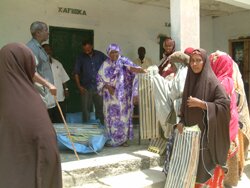SOMALIA: Situation of IDPs “at its worst” as aid runs out
 NAIROBI, (IRIN) – As more aid groups pull out of camps for internally displaced people (IDPs) and more people flee Mogadishu to escape the violence, the plight of IDPs is at its most extreme, says a doctor-turned-relief-worker in Mogadishu.
NAIROBI, (IRIN) – As more aid groups pull out of camps for internally displaced people (IDPs) and more people flee Mogadishu to escape the violence, the plight of IDPs is at its most extreme, says a doctor-turned-relief-worker in Mogadishu.
“[Relief] aid is at its lowest and the need is even greater than at any time,” Hawa Abdi, who turned her 26ha property into an IDP camp, told IRIN on 29 March.
She said hundreds of thousands of displaced families living in IDP camps on the outskirts of the city were facing an uncertain future as food begins to run out because they were no longer getting the necessary support from aid groups.
Fighting between government troops and insurgents in and around Mogadishu has been going on for years now but aid workers have described the displacement in 2010 as the highest in many years.
Abdi lives with at least 70,000 IDPs in her compound where, she said, “food is scarce as people who used to find work in Mogadishu can no longer do so due to the increased insecurity”.
She said many aid agencies had withdrawn without empowering local Somali aid workers to do the job. “They [aid agencies] cannot do the work for obvious reasons but at the same time they don’t trust us [Somalis] to do the job.”
Abdi blamed the warring parties, insurgents and the government troops. “They should protect those who come here to help their brothers and sisters but they are not doing so and are the ones forcing many good people to leave.”
She said the IDPs’ health was also deteriorating. Abdi, a gynaecologist, added that almost 40 percent of women coming to her clinic had experienced a spontaneous abortion.
Many children were also malnourished, she said.
Aynabo Ilmi, 43 and a mother of seven, has been an IDP since 2007 when she fled her home in Mogadishu after her husband was killed.
“The last time we received any food aid was in October 2009; up to now we were depending on help from other Somalis and whatever work we could find,” said Ilmi.
She said many IDPs depended on the food distribution and casual work “but now both are gone”.
Ilmi said it was almost impossible to go to Mogadishu because fares for public service vehicles had risen so much that “any money you make from work will end up paying for the fare; what is the point if I cannot come back with something for my children?”
Highest displacement
Despite the worsening conditions in IDP camps, more people were arriving daily, said Abdi.
“We have recorded over 1,000 families in the past week,†she said.
According to the UN Refugee Agency, UNHCR, the rate of displacement in 2010 has been among the highest in the past few years. So far this year, 169,000 have been displaced across the country, the agency said.
“People’s coping mechanisms are progressively weakening, at a moment when humanitarian agencies have very limited access to the needy,†Roberta Russo, a spokeswoman for UNHCR Somalia, said.
Asha Sha’ur, a member of Somalia’s civil society, told IRIN children were the worst-affected. “We are getting reports of severely malnourished children; many parents have reached their limit and don’t have anywhere to turn.â€
She said the lucky ones were those with relatives in the diaspora. “They may get some money to tide them over but the majority of the displaced have no one,” she said.
Abdi said the diaspora Somalis had been helping her clinic but the needs were often more than the help received. “These are their people and they should do everything humanly possible to help them get out of this predicament.”
Abdi said Somalis in the diaspora should not limit their involvement to only sending money “but get politically involved and help find a lasting solution”.
______
Source: IRIN
Comments
comments
 Calendar
Calendar






































